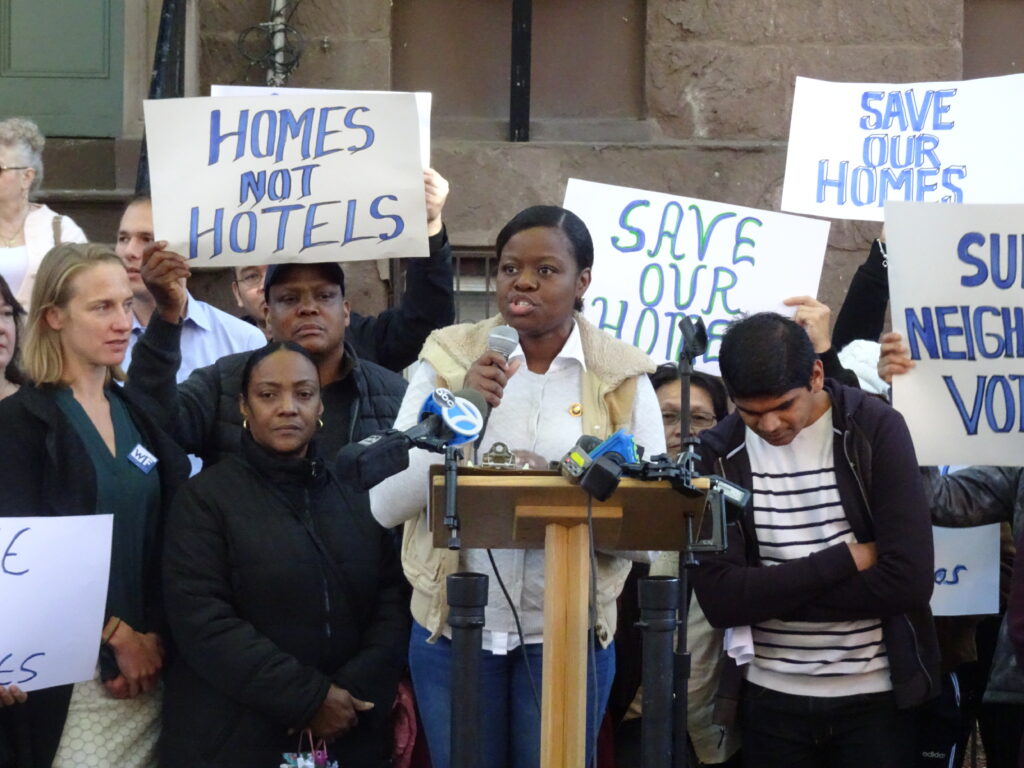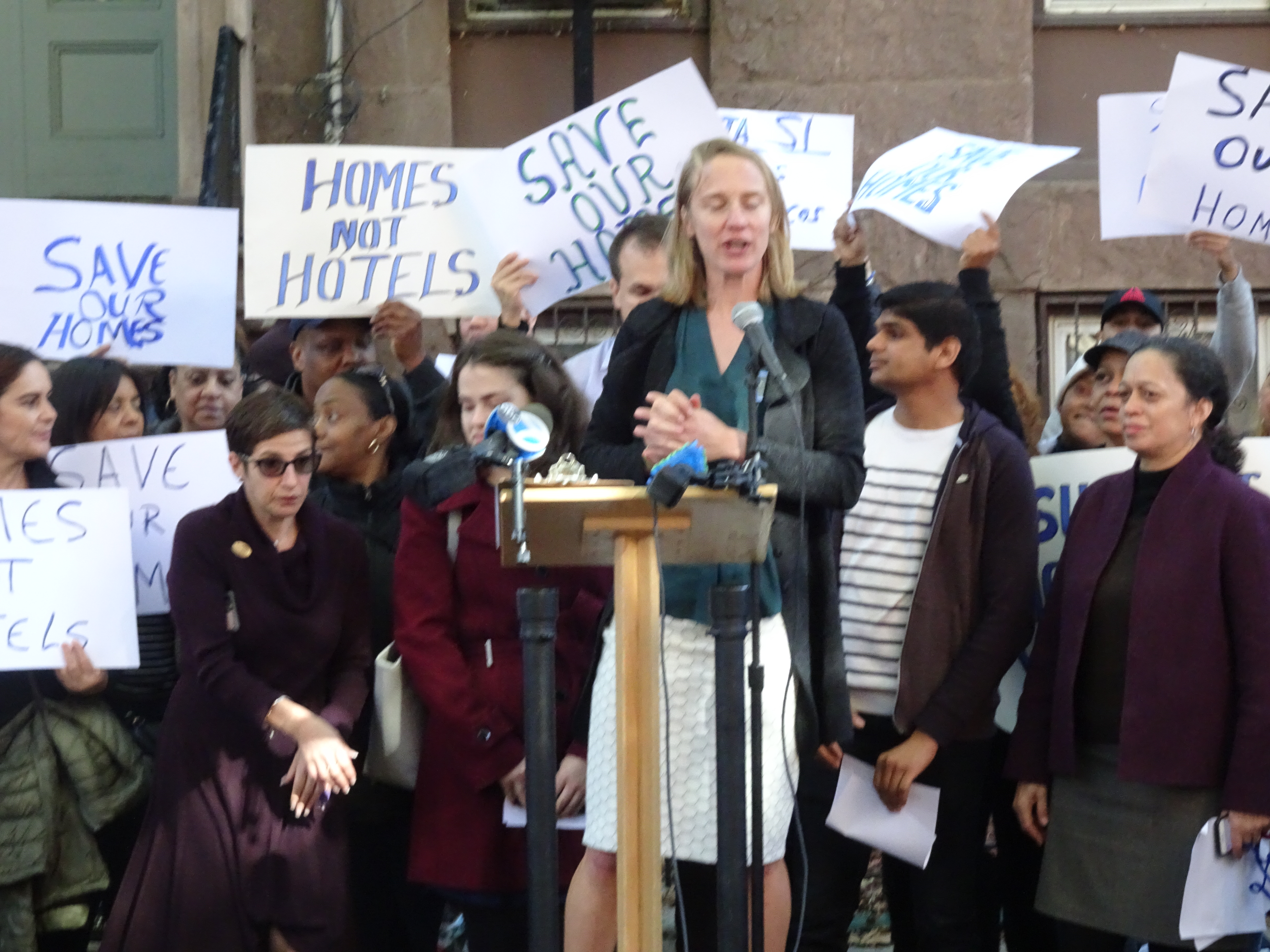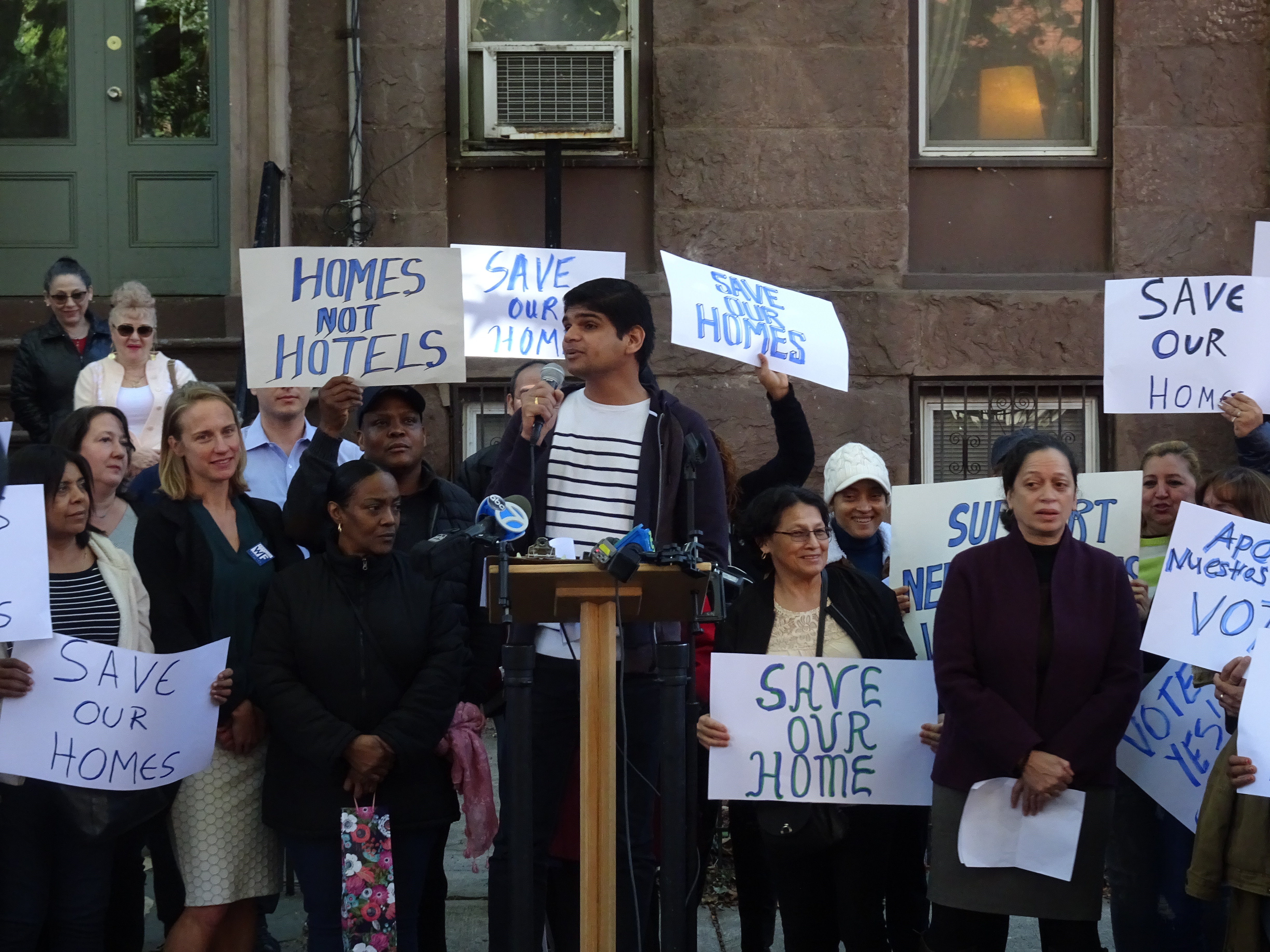To Airbnb or not Airbnb

Jersey City public officials didn’t have to go far to find what they called “a glaring example” of short-time rental abuse.
They needed no car, scooter or even a skateboard to traverse the block and a half from the front door of City Hall to the brownstone on Barrow Street. They didn’t even need GPS to find the right address.
While the protest that closed the busy uptown street to traffic brought out hundreds, only a handful of them were local residents, and hardly the hundreds of officials pre-event publicity promised.
But the gathering did include scores of local and statewide affordable housing advocates such as New Jersey Working Families Alliance, hoping to show just why short-term rental platforms such as Airbnb are not good for local residents – at least in regard to affordable housing for working families.

Of the roughly hundred protestors, many suspected unionized hotel workers held signs and chanted protests, supporting activists’ groups claims that the 2,651 Airbnb listing as driving up local rents, a claim that a report in the Boston Globe disputes in discussing a similar proposed ban on Airbnb ongoing in Boston.
Even to refer to the ban as “a ban” is to be accused of spreading misinformation, as some activists claim Airbnb is doing in their literature, despite the fact that if an owner doesn’t live in a building or lives in a business with five or more units, apartments will sit idle for more than 300 days a year – as a result of the ordinance passed by the city council last June.
Airbnb and property owners hoping to continue to collect a windfall on the short-term rental market have forced the matter to a public vote with a ballot on Nov. 5, pouring money into a campaign that would restore gold to the concept of Gold Coast in Jersey City.
In truth, the protestors included only three public officials, two of whom were the authors of the offending legislation. Mayor Steven Fulop – who has been a champion of the cause – either couldn’t find a scooter to rent or did not get the memo and was not on hand.
This massive show of elected officials and social justice groups gathered in front of a rent control building owned by a New York real estate agent and rented out short-term on the Airbnb platform.
These protestors decried the conversion of homes in Jersey City into what they claim have become full time hotels.
Historically, this section near Van Vorst Park was once predominately occupied by working poor and Latino families, who have several generations of gentrification have moved out to make way for more upscale tenants – this long before Airbnb or even the internet existed. This is one of the poshest parts of Jersey City, raising questions about how the city could authorize rent control for a building listed on the market as upscale market rate. The building is also a few doors down from other luxury buildings that saw their assessed value quadruple as a result of the 2017 reassessment or property.
Even as affordable housing advocates cheered on their crowd, their voices were sometimes drowned out by the rumble of concrete trucks making their way down Montgomery Street to the waterfront, feeding the perpetual construction on new luxury rental housing.
“We re already facing a shortage of affordable housing in Jersey City,” said Liz Fisher, a member of Jersey City Together’s Housing Team. “To see rent controlled housing being turned into full-time tourist rentals by outside investors is utterly unacceptable.”
According to Staci Berger, the president and CEO of Housing and Community Development Network of New Jersey, Jersey City has the largest percentage of New Jersey residents renting homes, and that working families would have to work 137 hours per week – three full-time jobs – to afford a modest two-bedroom house here. Several housing websites have listed Jersey City’s rents as among the highest in the nation. But, of course, both appear to be talking about market rate rents, not even affordable, which is based on median income of the area. Since wages of screwed upwards by high financial district salaries, affordable isn’t affordable when it comes to blue collar working people.
What may seem strange to many is that the NAACP has sided with Airbnb in this fight, partly because many of those servicing short-term rentals are local entrepreneurs who hire local people to clean the rooms, provide food and other essential services, who unlike workers in hotels do not have to pay union dues for the privilege.
Many short-term rentals offered on platforms such as Airbnb undermine the high costs associated with hotels, and so this has become a battle between those who already have and those who want even more, and not about poor people at all.
Many in the crowd were under the false assumption that Airbnb settled with the cities of Boston and Washington DC to accept restrictions similar to those being imposed in Jersey City. According to Liz DeBold Fusco, of Airbnb, the battles wage on in those cities, too, and that settlements were the result of suits filed by Airbnb against those cities over issues related to those bans.
Talking to residents who actually live in the areas most effected by short-term rentals, the big complaint is about the behavior of some people who actually stay in short-term rentals, misbehavior and loud parties that make life intolerable to live near.
Fusco said Airbnb has tried to work with the city to curb these abuses, even suggesting a “three strikes rule” that would ban a landlord from the Airbnb platform for failure to deal with the complaints. But the city, she said, has decided to go with the ban instead.
But ultimately, Airbnb doesn’t enforce local quality of life laws, the city does.
“If someone is speeding, you don’t ban cars,” Fusco said, describing many of the problems as a failure by the city to enforce its own laws.
The politics behind this conflict can be as critical as the issue itself. This is a battle Fulop needs to win or

will lose credibility for any future election – whether as mayor or to higher office. Ultimately, he has more boots own the ground to get the vote out – as demonstrated by his massive 2017 reelection victory. Also, corporations are not voters, and regardless of how much money Airbnb throws into this race, the decision will be up to people who live in Jersey City – many of whom will need to be convince short-term rentals benefit them.
Also working against Airbnb is the fact that the city didn’t ban all short-term rentals, and that small owner-occupied rentals will still be allowed to do business as usual, eliminating a powerful ally to overturning the city ordinance.
But many anti-Airbnb people are concerned about the language of the referendum in which a “yes” vote means no Airbnb and a “no” vote means the ordinance will be overturned.
Airbnb and others claim the ban – if it can be called that – will not stop short-term rentals but will simply send it “underground” to other platforms. And since the city legalized short-term rentals because it lacked the ability to police the market, limiting abuse will require more aggressive enforcement – something it should already be doing.
The big questions aren’t about whether or not corporate-sponsored short-term rentals raise rents by creating a shortage of long-term rental units. Jersey City has more rental units being constructed than any city in the nation and with Bayfront may well lead the nation in providing affordable housing as well. The real questions are who benefits from the massive influx of wealth being generated by tourist trade and will this wealth trickle down to poorer people in the city if left exclusive in the hands of the hotel industry?







The facts are very clear that unregulated Airbnb hurts Jersey City and Jersey City Residents. Vote Yes. https://www.citylab.com/equity/2019/02/study-airbnb-cities-rising-home-prices-tax/581590/ https://forcetheissuenj.org/2019/10/13/vote-yes-to-regulations-on-short-term-rentals-in-jersey-city/